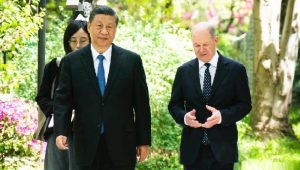29-04-2024
BERLIN: Six suspected spies have been arrested in Germany this month alone, in what has become a torrent of allegations of Russian and Chinese espionage.
For the far-right Alternative for Germany (AfD) party it has proved especially embarrassing, because their top two candidates for the European elections in June have been caught in the crosshairs.
 An aide to MEP Maximilian Krah, who heads the party’s list, has been arrested on suspicion of spying for China. Jian G is accused of being an “employee of a Chinese secret service”.
An aide to MEP Maximilian Krah, who heads the party’s list, has been arrested on suspicion of spying for China. Jian G is accused of being an “employee of a Chinese secret service”.
Prosecutors have also begun preliminary investigations into the politician himself over alleged payments from pro-Russian and Chinese sources. Krah denies any wrongdoing.
Days earlier, Petr Bystron, the second name on the AfD list, denied allegations that he received cash from the Voice of Europe website, alleged by European intelligence to have been a front for Russian intelligence but the allegations go well beyond the AfD.
Two German nationals of Russian origin have been arrested on suspicion of plotting to sabotage Germany’s military aid to Ukraine while three Germans have been detained for allegedly planning to pass on advanced engine designs to Chinese intelligence.
“It is really unusual to have detentions of three networks [allegedly] engaged in some sort of espionage for Russia and China coming almost at the same time,” said Noura Chalati, a research fellow at the Leibniz Centre for the Modern Orient.
In all three espionage cases, the efforts of Germany’s BfV domestic intelligence agency are believed to have been crucial.
“Our security authorities… have massively strengthened their counter-espionage efforts,” Interior Minister Nancy Faeser said.
 The arrests came hard on the heels of Chancellor Olaf Scholz’s return from wide-ranging talks with China’s President Xi Jinping in Beijing.
The arrests came hard on the heels of Chancellor Olaf Scholz’s return from wide-ranging talks with China’s President Xi Jinping in Beijing.
Andrei Soldatov, an expert on the Russian security services, believes the case of the Russian-German pair could reflect a desire by the Kremlin escalate attacks on aid to Ukraine.
“It is just a completely new level of escalation,” Soldatov told media. “These people (allegedly) collected information to help organize sabotage operations against military facilities on German soil.”
Meanwhile, Roderich Kiesewetter, a former German Army officer who is now an opposition MP, alleged China was seeking to gain access to advanced research that could be useful for military or other purposes.
“China sees opportunities to exploit Germany’s openness to access our knowledge and technology,” he told media.
Even so, Andrei Soldatov believes Berlin is putting down a marker.
“An arrest is always a political decision,” he says.
“Counter-intelligence agencies in all countries prefer not to arrest people because it’s better to follow them and monitor their activities in order to learn more about their networks and their activities.”
One reason the political decision may have been taken is that Germany’s adversaries – particularly Russia – have appeared increasingly keen to publicly humiliate Berlin as it has become more assertive in its foreign relations.
A particular low point was the leaking in March by Russian sources of a phone call between top generals discussing supplying long-range Taurus missiles to Ukraine. (Int’l Monitoring Desk)
 Pressmediaofindia
Pressmediaofindia




